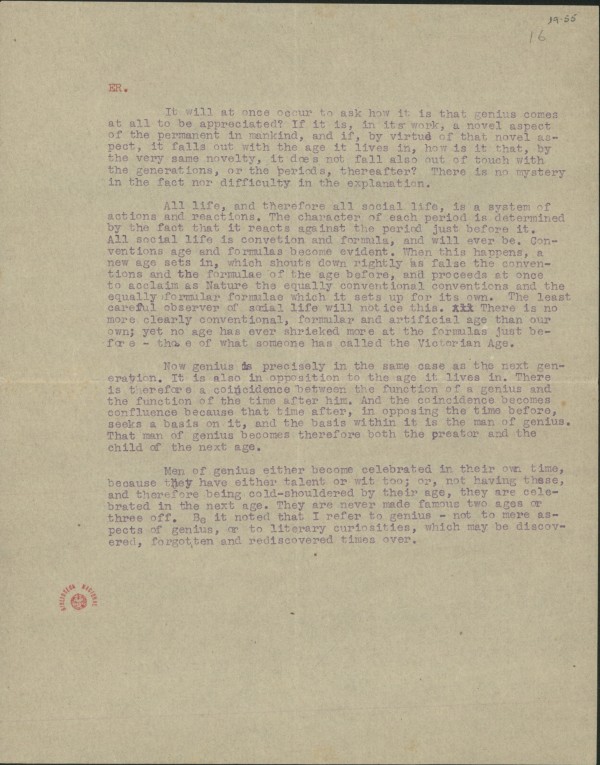Identificação
[19 – 55]
Erostratus.
It will at once occur to ask how it is that genius comes at all to be appreciated? If it is, in its work, a novel aspect of the permanent in mankind, and if, by virtue of that novel aspect, it falls out with the age it lives in, how is it that, by the very same novelty, it does not fall also out of touch with the generations, or the periods, thereafter? There is no mystery in the fact nor difficulty in the explanation.
All life, and therefore all social life, is a system of actions and reactions. The character of each period is determined by the fact that it reacts against the period just before it. All social life is convention and formula, and will ever be. Conventions age and formulas become evident. When this happens, a new age sets in, which shouts down rightly as false the conventions and the formulae of the age before, and proceeds at once to acclaim as Nature the equally conventional conventions and the equally formular formulae which it sets up for its own. The least careful observer of social life will notice this. There is no more clearly conventional, formular and artificial age than our own; yet no age has ever shrieked more at the formulas just before – those of what someone has called the Victorian Age.
Now genius is precisely in the same case as the next generation. It is also in opposition to the age it lives in. There is therefore a coincidence between the function of a genius and the function of the time after him. And the coincidence becomes confluence because that time after, in opposing the time before, seeks a basis on it, and the basis within it is the man of genius. That man of genius becomes therefore both the creator and the child of the next age.
Men of genius either become celebrated in their own time, because they have either talent or wit too; or, not having these, and therefore being cold-shouldered by their age, they are celebrated in the next age. They are never made famous two ages or three off. Be it noted that I refer to genius – not to mere aspects of genius, or to literary curiosities, which may be discovered, forgotten and rediscovered times over.
[19 – 55]
Heróstrato.
Ocorrerá imediatamente perguntar como é que o génio chega, de todo, a ser apreciado? Se for, na sua obra, um aspecto novo do permanente na humanidade e se, em virtude desse novo aspecto, estiver em desacordo com a época em que vive, como é que, por essa mesma novidade, não está também em desacordo com as gerações ou períodos seguintes? Não existe mistério no facto, nem dificuldade na explicação.
Toda a vida, e, portanto, toda a vida social, é um sistema de acções e reacção. O carácter de cada período é determinado pelo facto de que reage contra o período imediatamente anterior. Toda a vida social é convenção e fórmula e sempre será. As convenções envelhecem e as fórmulas tornam-se evidentes. Quando isto acontece, estabelece-se uma nova época, que proclama como falsas as convenções e fórmulas da época anterior e procede imediatamente a aclamar como Natureza as convenções igualmente convencionais e as fórmulas igualmente formulares que cria para si. O observador mais desatento da vida social notará isto. Não existe época mais claramente convencional, formular e artificial do que a nossa; contudo, nenhuma época jamais gritou tanto contra as fórmulas anteriores – aquelas daquilo a que alguém chamou Época Vitoriana.
Ora o génio encontra-se precisamente no mesmo caso que a geração seguinte. Encontra-se também em oposição à época em que vive. Existe, portanto, uma coincidência entre a função de um génio e a função do tempo seguinte. E a coincidência torna-se confluente porque esse tempo seguinte, ao opor-se ao tempo anterior, busca uma base nele e a base no seu interior é o homem de génio. Esse homem de génio torna-se, portanto, tanto o criador quanto a criança na época seguinte.
Os homens de génio tornam-se ou celebrados no seu tempo, porque têm talento ou também sagacidade; ou, não os tendo, e, portanto, sendo tratados com indiferença pela sua época, são celebrados na época seguinte. Nunca se tornam famosos duas ou três épocas depois. Note-se que me refiro ao génio – não a meros aspectos do génio ou a curiosidades literárias, que podem ser descobertas, esquecidas e redescobertas tempos depois.


